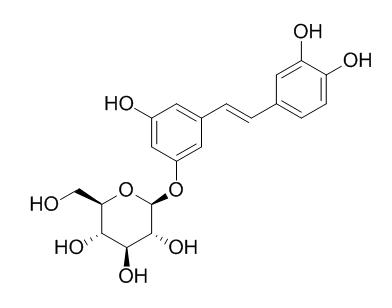Astringin
Astringinin is a potent antiarrhythmic agent with cardioprotective activity in ischemic and ischemic-reperfused rat heart, the beneficial effects of astringinin in the ischemic and ischemic-reperfused hearts may be correlated with its antioxidant activity and upregulation of NO production. Astringinin can significantly attenuate proinflammatory responses and hepatic injury after trauma-hemorrhage, the salutary effects of astringinin administration on attenuation of hepatic injury following trauma-hemorrhage are likely due to reduction of pro-inflammatory mediator levels.
Inquire / Order:
manager@chemfaces.com
Technical Inquiries:
service@chemfaces.com
Tel:
+86-27-84237783
Fax:
+86-27-84254680
Address:
1 Building, No. 83, CheCheng Rd., Wuhan Economic and Technological Development Zone, Wuhan, Hubei 430056, PRC
Providing storage is as stated on the product vial and the vial is kept tightly sealed, the product can be stored for up to
24 months(2-8C).
Wherever possible, you should prepare and use solutions on the same day. However, if you need to make up stock solutions in advance, we recommend that you store the solution as aliquots in tightly sealed vials at -20C. Generally, these will be useable for up to two weeks. Before use, and prior to opening the vial we recommend that you allow your product to equilibrate to room temperature for at least 1 hour.
Need more advice on solubility, usage and handling? Please email to: service@chemfaces.com
The packaging of the product may have turned upside down during transportation, resulting in the natural compounds adhering to the neck or cap of the vial. take the vial out of its packaging and gently shake to let the compounds fall to the bottom of the vial. for liquid products, centrifuge at 200-500 RPM to gather the liquid at the bottom of the vial. try to avoid loss or contamination during handling.
Saudi Pharm J2020, 10.1016
Analytical Methods2018, 10(27)
Front Immunol.2024, 15:1423776.
Front Pharmacol.2022, 13:883475.
Korean Journal of Pharmacognosy2017, 48(4):320-328
ACS Omega.2023, 9(1):1278-1286.
Molecules.2019, 24(10):E1930
Int J Mol Sci.2023, 24(18):13713.
BMC Plant Biol.2022, 22(1):128.
J Nat Med.2022, 76(1):59-67.
Related and Featured Products
Chinese Journal of Physiology, 2011, 54(3):183-9.
Astringinin-mediated attenuation of the hepatic injury following trauma-hemorrhage.[Pubmed:
21789900]
Although Astringinin administration under adverse circulatory conditions is known to be protective, the mechanism by which Astringinin produces the salutary effects remains unknown.
METHODS AND RESULTS:
Different doses of Astringinin (0.01, 0.03, 0.1, 0.3 mg/kg of body weight) or vehicle were administered intravenously during resuscitation. Concentrations of plasma aspartate aminotransferase (AST) with alanine aminotransferase (ALT) and various hepatic parameters were measured (n = 8 rats/group) at 24 h after resuscitation. One-way ANOVA and Tukey testing were used for statistical analysis. Trauma-hemorrhage significantly increased plasma AST and ALT levels at 24 h postresuscitation; there was a dose-related benefit when Astringinin was administered at doses of 0.01 to 0.3 mg/kg. In Astringinin-treated (0.3 mg/kg) rats subjected to trauma-hemorrhage, there were significant improvements in liver myeloperoxidase (MPO) activity (237.80 +/- 45.89 vs. 495.95 +/- 70.64 U/mg protein, P < 0.05), interleukin-6 (IL-6) levels (218.54 +/- 34.52 vs. 478.60 +/- 76.21 pg/mg protein, P < 0.05), cytokine-induced neutrophil chemoattractant (CINC)-1 (88.32 +/- 20.33 vs. 200.70 +/- 32.68 pg/mg protein, P < 0.05), CINC-3 (110.83 +/- 26.63 vs. 290.14 +/- 76.82 pg/mg protein, P < 0.05) and intercellular adhesion molecule (ICAM)-1 concentrations (1,868.5 +/- 211.5 vs. 3,645.0 +/- 709.2 pg/mg protein, P < 0.05), as well as in histology. Results show that Astringinin significantly attenuates proinflammatory responses and hepatic injury after trauma-hemorrhage.
CONCLUSIONS:
In conclusion, the salutary effects of Astringinin administration on attenuation of hepatic injury following trauma-hemorrhage are likely due to reduction of pro-inflammatory mediator levels.
Free radical Bio. Med., 2001, 30(8):877-83.
Beneficial effects of astringinin, a resveratrol analogue, on the ischemia and reperfusion damage in rat heart.[Pubmed:
11295530]
Astringinin (3,3',4',5-tetrahydroxystilbene), a resveratrol (3,4',5-trihydroxystilbene) analogue with considerably higher antioxidative activity and free radical scavenging capacity, was introduced to examine its cardioprotective effects in ischemia or ischemia-reperfusion (I/R) rats.
METHODS AND RESULTS:
In the present study, the left main coronary artery was occluded by the following procedures: (i) 30 min occlusion, (ii) 5 min occlusion followed by 30 min reperfusion, and (iii) 4 h occlusion. During the same period, Astringinin pretreatment also increased nitric oxide (NO) and decreased lactate dehydrogenase (LDH) levels in the carotid blood. In animals subjected to 4 h coronary occlusion, the cardiac infarct size (expressed as a percentage of occluded zone) was reduced from 44.4 + or - 4.1% to 19.1 + or - 2.4% by Astringinin (2.5 x 10(-4) g/kg).
CONCLUSIONS:
We conclude that, Astringinin is a potent antiarrhythmic agent with cardioprotective activity in ischemic and ischemic-reperfused rat heart. The beneficial effects of Astringinin in the ischemic and ischemic-reperfused hearts may be correlated with its antioxidant activity and upregulation of NO production.



